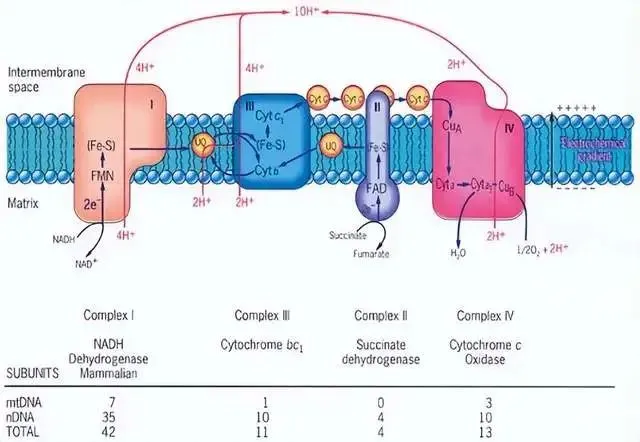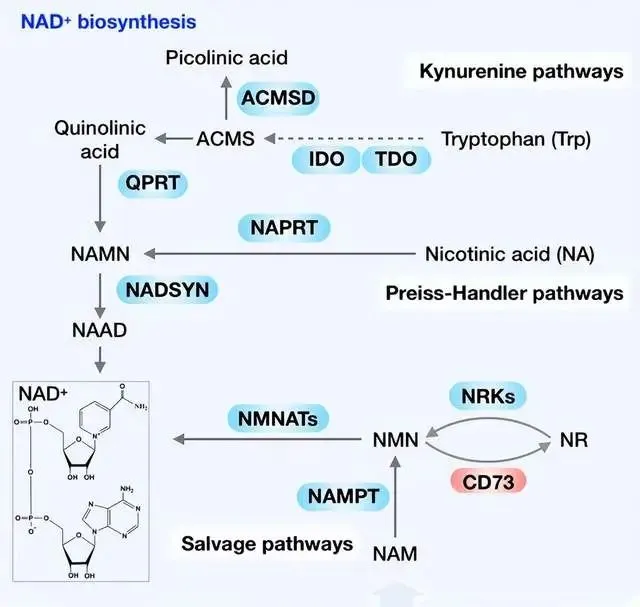Abstract
Imbalances in NAD+ homeostasis have been linked to aging and various diseases. Nicotine, a metabolite of the NAD+ metabolic pathway, has been found to possess anti-inflammatory and neuroprotective properties, yet the underlying molecular mechanisms remained unknown. Here we find that, independent of nicotinic acetylcholine receptors, low-dose nicotine can restore the age-related decline of NAMPT activity through SIRT1 binding and subsequent deacetylation of NAMPT, thus increasing NAD+ synthesis. 18F-FDG PET imaging revealed that nicotine is also capable of efficiently inhibiting glucose hypermetabolism in aging male mice. Additionally, nicotine ameliorated cellular energy metabolism disorders and deferred age-related deterioration and cognitive decline by stimulating neurogenesis, inhibiting neuroinflammation, and protecting organs from oxidative stress and telomere shortening. Collectively, these findings provide evidence for a mechanism by which low-dose nicotine can activate NAD+ salvage pathways and improve age-related symptoms.
Recently, a study published in the international journal Nature Communications has garnered widespread attention. The research team introduced trace amounts of nic (2μg/mL) into the drinking water of mice, allowing them to ingest extremely low doses of nic through drinking. The study results revealed that long-term consumption of trace ni water significantly improved NAMPT activity and NAD+ synthesis, leading to enhancements in male mice’s glucose metabolism, cognitive function, and the alleviation of aging-related symptoms.
This study has raised a crucial question: can nic delay aging in humans? Does smoking contribute to longevity?

Nic Promotes NAD+ Synthesis:
Research indicates that trace amounts of nicotine can stimulate NAD+ synthesis, contributing to the improvement of cellular function and metabolism, and potentially offering benefits for delaying aging.
Lower Addiction Potential of Nicotine E-Cigarettes:
Compared to traditional tobacco, nic e-cigarettes are considered to have lower addictive properties, meaning individuals may find it easier to control their NIC intake and reduce smoking frequency.
Reduced Inhalation of Harmful Substances:
Low-concentration nicotine e-cigarettes do not contain harmful substances found in tobacco smoke such as tar and carbon monoxide, reducing health risks associated with smoking, particularly for cardiovascular health.
Potential Anti-Aging Effects:
Low-concentration nic e-cigarettes may help improve intracellular NAD+ levels, a molecule associated with anti-aging. By enhancing NAMPT activity, nic can theoretically promote NAD+ production, as demonstrated in some experimental studies. NAD+ plays a crucial role in regulating cellular metabolism and repair processes. By maintaining healthy cellular metabolism, nic may help mitigate cellular damage associated with aging.

Enhancement of Cognitive Function:
Research suggests that low-concentration nicotine may contribute to improved cognitive function. Some symptoms of dementia are linked to reduced NAD+ levels and disrupted cellular metabolism. Thus, by increasing NAD+ levels, nicotine may help protect the brain from cognitive decline.
Possible Anti-Inflammatory Effects:
Certain inflammations are closely related to the aging process. Some studies suggest that nicotine may have anti-inflammatory properties, lowering chronic inflammation levels. By reducing inflammation, nicotine might contribute to delaying some age-related health issues.
Potential Research Opportunities:
This study offers scientists a new research direction to delve into the effects of low-concentration nicotine on NAD+ levels and anti-aging. This holds promise for advancing the field of anti-aging research.
Possibly Beneficial for Metabolism and Weight Management:
Some studies propose that nicotine may have effects on weight control and metabolism. Maintaining a healthy weight and metabolism in older individuals may positively impact longevity and the delay of aging.
Potential Anti-Depressant Effects:
Some research indicates that nicotine may possess anti-depressant effects, which can be particularly relevant as depression is common among older adults. Alleviating depressive symptoms can improve the quality of life and support mental health maintenance.
Consider Low-Nicotine E-Cigarettes for a Balanced Approach:
If you are intrigued by the potential benefits of low-concentration nicotine and are a current smoker or someone looking to explore safer alternatives, consider trying low-nicotine e-cigarettes. The devices Mon G20 2500 Puffs offer a controlled and customizable way to experience nicotine without the harmful byproducts of traditional smoking. However, always remember to prioritize your health and well-being, and consult with a healthcare professional before making any significant changes to your smoking habits.

Limitations of Animal Models:
This study used a mouse model, and only male mice were involved. There are significant biological differences between humans and mice, making it challenging to directly extrapolate these results to humans.
Limited Metrics for Measuring Aging:
While the researchers observed improvements in some aging-related symptoms, aging is a complex biological process that cannot be comprehensively measured by a few indicators.
Nicotine is Not the Sole Pathway:
While NAD+ levels are associated with anti-aging, there are numerous ways to increase NAD+ levels without necessarily resorting to nicotine. Healthy lifestyles, moderate exercise, and diet can enhance NAD+ levels without the potential risks of nicotine.
Balancing Health Risks:
While low-concentration nicotine e-cigarettes are relatively safer, there is still a need to strike a balance between the potential health risks and anti-aging benefits. Especially for non-smokers and minors, using e-cigarettes may not be justifiable for the sake of anti-aging effects.
Conclusion:
Despite the intriguing findings from this study, current evidence is insufficient to support the idea of using nicotine e-cigarettes to delay aging or achieve longevity. Furthermore, smoking is still widely recognized as an unhealthy behavior associated with numerous diseases and premature death. Therefore, a cautious approach to nicotine is warranted, respecting the development of scientific research and adopting a scientifically objective stance toward the potential impacts of nicotine. When pursuing a long and healthy life, adopting a healthy lifestyle and avoiding harmful habits remain more critical than relying on smoking for potential anti-aging effects.


